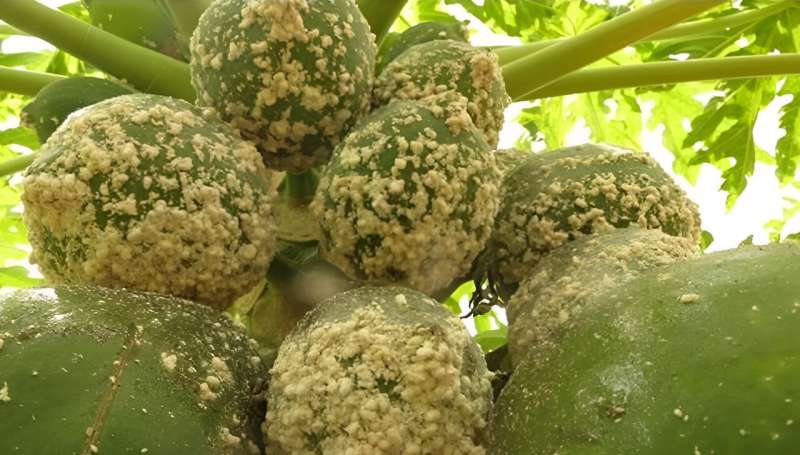This article has been reviewed according to Science X's editorial process and policies. Editors have highlighted the following attributes while ensuring the content's credibility:
fact-checked
proofread
Wasps help farmers fight mealybug pest in Kenya

Papaya farmers in Kenya are turning to a novel solution to combat the devastating papaya mealybug pest—parasitic wasps.
The mealybug, native to Central America, is a rapidly spreading crop pest that has been wreaking havoc on papaya crops in Kenya since 2015, causing significant economic losses for smallholder farmers.
Dorcus Lekesio, a smallholder farmer from Baringo county, has been a papaya farmer for more than 15 years. She depends on it to feed her family and educate her children.
"Papaya farming is my main source of income … my livelihood depends on it," she says.
She says the mealybug infestation reduced her expected harvest by over half in the last year.
"We used many chemicals to spray the plants, but it has not been working," she adds.
Alfred Bolo, another papaya smallholder from Kwale, in coastal Kenya, encountered the mealybugs on his farm in January last year.
He says he used pesticides, but they only provided temporary relief.
"I was very annoyed … I used to crush them with [my] bare hands because they were really annoying me," he says.
Bolo then attended a farmers' workshop convened by the County Government of Kwale, Kenya, in partnership with the agricultural research organization CABI (SciDev.Net's parent organization), where he learned about the papaya mealybug.
"I was surprised to learn that the pest was not only affecting me, but also many other farmers in the region," he says.
Losses
The mealybug pest is native to Central America.
In Africa, it was first reported in Ghana. It is believed to have invaded East Africa between 2015 and 2020, causing severe losses to smallholder farmers. CABI estimates that in East Africa the pest is responsible for destroying 57–91% of crops and costing farmers £2,224 (US$ 2,854) per hectare every year.
In 2019, scientists from CABI, along with the Kenya Plant Health Inspectorate Service, Kenya Agricultural and Livestock Research Organization, and Kenyatta University, identified the wasp, Acerophagus papaya, as a prospective candidate for biological control.
They say it offers a natural and safe solution to the problem of papaya mealybug.
The Kenya Agricultural and Livestock Research Organization then imported Acerophagus papayae, a parasitic wasp from Ghana, and introduced it on Bolo's farm in March, 2023.
"It took about one month for the parasitoids to spread around the farm. They did not eliminate the mealybug but controlled their numbers to the extent that they could not cause economic losses to me," Bolo told SciDev.Net.
He has since increased his plant production and saved on pesticide costs. "I am now harvesting about 400kgs per week, which is a good harvest."
Selpha Miller, Post-doctoral research fellow, based at CABI, says the Kenya Standing Technical Committee on Imports and Exports gave CABI and its implementing partners, The Kenya Agricultural and Livestock Research Organization and Kenya Plant Health Inspectorate Service, an approval to release the parasitoids at the coastal counties where the pest was first reported.
Following successful management of the pest at the coast, she says, the Kenya Standing Technical Committee on Imports and Exports has approved the release in five more counties, including Baringo.
"Based from the experience at the coast, where the pest was able to be managed after six months, it is also expected it will be efficient in other regions," Miller told SciDev.Net.
She says the parasitoid is expected to manage papaya mealybug to levels that will not cause economic damage to the farmer, "just like the parasitoid has successfully managed the pest in Ghana, where we got the parasitoid."
"It is very safe and efficient," she added.
Miller urges African governments to invest in classical biological control of papaya mealybug using the parasitoid.
"Papaya mealybug is a very devastating pest that can lead to huge crop losses if not controlled," she said.
Resistance
One challenge is the potential development of resistance by the mealybug to the parasitic wasp.
"We need to monitor the situation closely to ensure that the wasp remains effective," says Miller.
Despite these challenges, the use of Acerophagus papayae remains a promising solution to the papaya mealybug problem, according to agriculture specialists.
Vincent Abuje, Baringo county director of agriculture, tells SciDev.Net that the Acerophagus papaya is a welcome relief as the mealybug pest has caused massive losses for farmers in the county, with many not knowing how to manage it.
"Papaya farming is a major horticultural enterprise here and a source of livelihood for many households," Abuje says.
He added that farmers tried using pesticides, but the pest would "go away but resurface after about two weeks."
This led to frustration among farmers, who were left "staring at losses."
Abuje said 28 agricultural extension officers were trained to advise farmers on identifying and handling the pest, and a biological control method is set to be introduced.
Abuje says he is hopeful that this will help farmers control the pest.
"We are happy and hopeful, as this has worked elsewhere, that it will help our farmers to control the destructive pest."
Lekesio's farm is one of those where scientists will trial parasitoids to help control the spread of papaya mealybug. "We are really praying that this works … we desperately need it to work," she says.
Provided by SciDev.Net





















